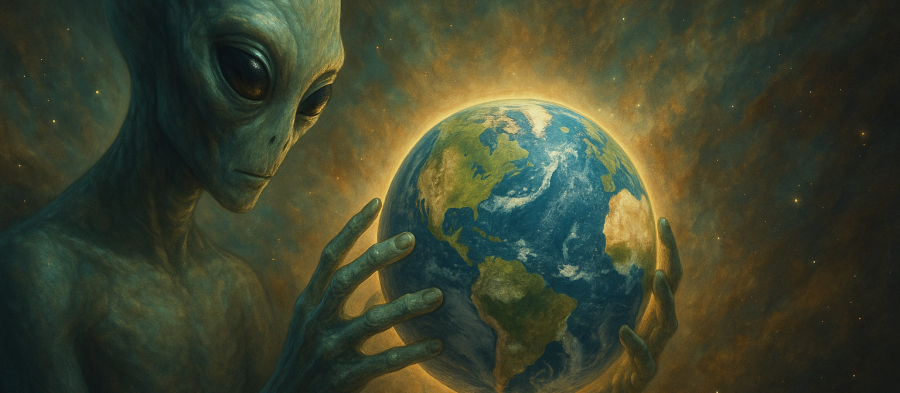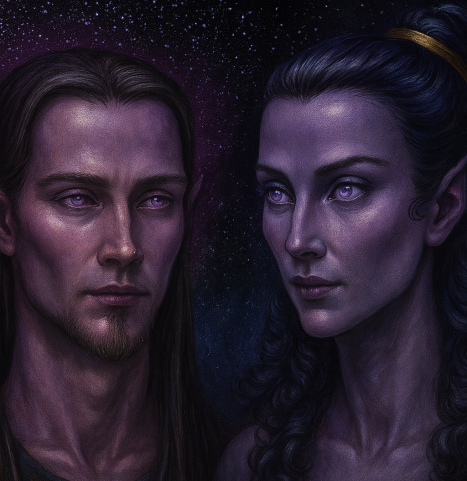
When the word creationism appears in a conversation, our minds immediately defer to religion. On Earth, most of us are familiar with religions and various types of worship. Each has different names for their deities, origin stories, and the individuals who supposedly spoke to divine creation. These core elements—origin myths, divine beings, and the fear of the unknown—are shared across them all.
That fear spans many questions: What happens after we die? What are the unexplained phenomena around us? Who are we really? Where did we come from? How did we come to be? Many believe they know the answers; only a handful truly understand them.
Not even the highest authorities will admit they fully comprehend the vast topic of creation, since its very nature implies the beginning of everything. In my years of learning from extra-terrestrials, we often spoke about how it all began. Of all beings, they should know, of course. They’ve certainly had more time to explore and learn about the wild and limitless universe around us. But even they make assumptions about creation.
The extra-terrestrial approach to grand topics blends spirituality and science: to understand and to know.
All the species and races I’ve encountered in my travels seemed to have shed religion and belief systems after becoming star-faring. Yet some still use cultural phrases—such as their equivalent of “oh my God.” There is no unified religion among them, but rather an educated assumption about how everything came to be.
Most species were created by an older race, who were created by another before them, and so on. Humans are included in that list. So at least one of the grand questions has an answer—according to E.T. knowledge.
To the E.T. philosopher, if one thing comes into existence from another—whether deliberate or accidental—what does that mean for the universe? And what are the primary differences between artificial and natural?
We make machines to improve our lives; they are artificial. Yet we come from procreation to further the biological life of our species—and that is considered natural. The forces of this universe constantly shape matter, and we call that natural too. But do these forces possess some form of intelligence? How did they appear? Does the universe itself have a consciousness, like we do?
What’s the answer?
During these conversations, my contacts told me there is a type of consciousness that exists above all. They say it doesn’t think or feel the way we do, and everything living is an extension of itself.
“What are you talking about?” I asked Antajisan one day during my late teens. She is one of my primary E.T. contacts and has been part of my life longer than any of the other beings I’ve known. She is a physical being, like a human, but her senses and comprehension extend far beyond our best and brightest minds on Earth.
She said:
“On the outside, we all appear to be separate beings. Our structures are different, our genetic makeup is unique, and our ways of thinking and interpreting the universe vary. No two beings are alike. However, we all come from the same place. Our bodies were forged in the same universe, and our minds…”
“Are we all alike mentally?” I asked.
“Our consciousness—what some may call a soul—originates from the same place. We are tiny pieces broken from something even larger than the universe itself. This is how we can talk to each other beyond our physical bodies,” she said, referring to psychic ability.
“What is this ‘larger thing’?” I asked.
“We call it Akashi,” she replied (my interpretation of the foreign word). “It’s not alive, nor is it dead—it exists outside. It is a divine being and a thought. It is all things, and it is one thing.”
“So, like a turbo-god or something?” I asked. I didn’t really understand what she was trying to say. Everything she said sounded like a contradiction. The only word that had any clarity in my mind was “all.”
“I know it’s confusing,” she said. “I don’t fully understand it myself, nor do those who study this ‘thing.’ We know of its existence by studying the seemingly limitless and indestructible nature of consciousness. It resides in all things, in varying amounts, and has the ability to connect with other versions of itself. If there are pieces, then there is a greater whole.”
Akashi—just another name for just another god? That’s what I thought at the beginning. But over the years, I learned it was so much more.
I’ll be the first to admit that my knowledge of physics is limited—and my understanding of E.T. physics is even more so. Consciousness permeates the entire universe and multiverse, in various levels. It affects space and matter at the quantum level. It’s been observed that consciousness influences the tiniest particles, and that influence ripples outward to affect larger systems. This cause and effect—from the smallest things—may be what led to the formation of the universe.
I remember asking in the early years of contact what the E.T.s thought of the Big Bang.
First of all: “Nothing” does not exist in this universe. And certainly, nothing doesn’t create something. Energy and matter are always shifting into new forms, giving the illusion of newness—when really, it’s the ancient wearing a new face.
According to them, there was a type of apocalypse on a universal scale, but matter existed long before the rapid shift occurred. This reorganization of matter was the beginning of what we interpret as the Big Bang.
Then I wondered—if something existed in this space beforehand, how old is the universe?
Mezreth, one of my contacts and a very ancient being, chuckled and replied, “If I told you the real number, I still wouldn’t be finished even after your body died.”
So I’m betting it’s very old.
Naturally, I followed up with: “What was before that? How did that start?”
“To us, this place has always been here,” he said. “It changes face now and then. These questions were asked before the Big Bang, are being asked now, and will be asked again. But tell me—would you change if you really knew the answers?”
“I have no idea. I just assumed you would have a better comprehension of this whole place.”
“True,” he said, “but we can never know the absolute. Because like ‘nothingness,’ the ‘absolute’ doesn’t exist here. What we do know is that creation and destruction, beginning and end, aren’t separate forces—they are one thing: transmutation.”
That made me think about ancient species that have lived in this universe for uncounted eons—and their obsessive need to seed life on every surface that acts as a petri dish or cradle. Mezreth’s people are creators of many wondrous and terrible things. They build and build and build—and have done so for millions of years.
What’s the point?
Mezreth laughed again. “My people are endlessly curious. It’s both our pride and our punishment. Some of us create to further our lives and deepen our understanding. Others create to rule over their creations—to mimic the universe on a small scale.”
“What did you learn from it?” I asked.
“We are still learning how many unique directions life can take, but we’ve watched all forms of life struggle with the same challenges. It’s imperfect because we are. It’s chaotic because we are. But you are our legacy—as a child is to a parent. You have much to learn from us, as we do from you. That is Akashi.”
That is Akashi.
Mezreth’s people created life to better understand themselves—just as Akashi makes countless pieces of itself. All floating through the universe, waiting to be born into new shoes, claws, fins, or hooves, just to experience existence through another “face.” Constantly interacting with other parts of itself to learn from the deepest realms of its vast psyche.
After so many years of learning from E.T.s, I’ve come to believe: we truly are the same. Appearance doesn’t matter. We are simply children born on different worlds. There are no true divisions—no groups, companies, tribes, or religions—if we are fundamentally the same being.
Not only are we pieces of Akashi, but we are a rippling sea of consciousness.
(Originally submitted to the UFO International Mag)






